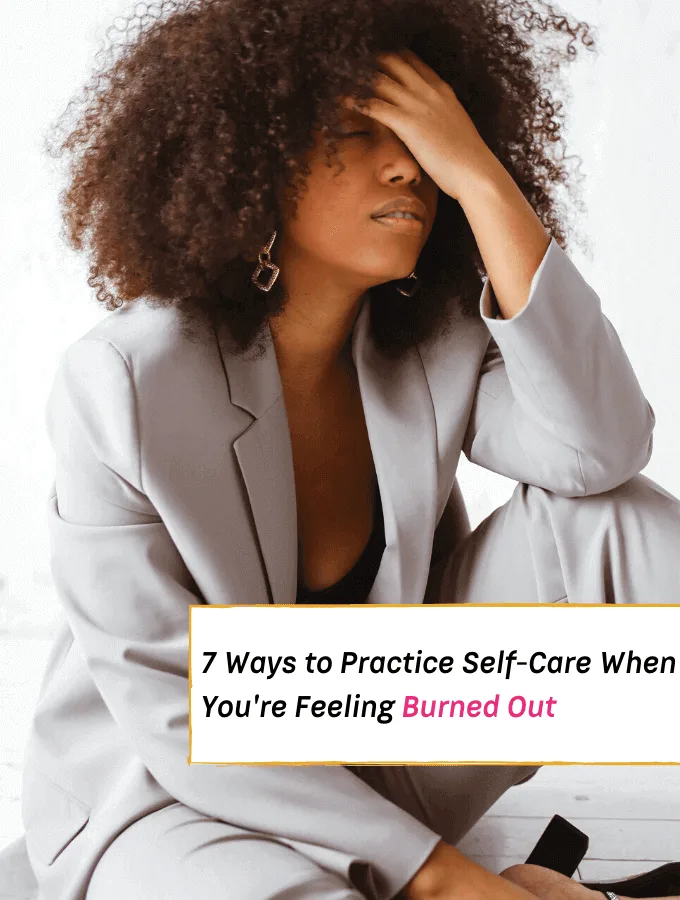
Are you suffering from burnout?
Burnout is a form of depression that can be caused by both life and work stress, paired with overthinking.
When the brain becomes too tired to handle all this information it begins to shut down.
When it shuts down, it causes an inner conflict for those suffering in silence.
In this article, we will discuss ‘burnout syndrome,’ which is now known for the first time as an official medical condition.
This burnout syndrome is a result of the negative effects that prolonged exposure to pressure can have on an individual. This cumulative stress manifests in many different ways, such as bad relations with co-workers or not saying “no” enough. It may even come from having too much negative self-talk about your current point of view and job situation.
What can you do to help yourself when feeling burned out? There are a lot of ways, let’s break it down because there are some straightforward yet powerful actions that will make all the difference.
Similar Topics:
How to Set Intentions for the Day – 10 Easy Steps
10 Brilliant Ways to Master Self Discipline
How to recognize & Treat Burnout Fast

What triggers burnout?
There’s no denying that work stress is imminent for many people because of the pressure on a day-to-day basis. However, there are also other causes to this imbalance we feel. In order to treat your burnout properly and turn things around, you must first figure out what exactly is triggering your exhaustion.
Here are some of the triggers that can cause burnout: work stress, fatigue from overworking too often, and emotional overload. All these three factors create a state where you have unhealthy habits like overworking or sleeping less than usual which causes your immune system to suffer immensely.
To treat this imbalance effectively so you don’t fall into an even more serious situation such as depression due to exhaustion; prevention is key before things spiral out of control!
What constitutes feeling ‘burned out’?
Feeling ‘burned out’ can also be the result of many factors from feeling overly fatigued, having negative self-talk, insomnia, having minor or immense aches and pains throughout the body including headaches, and a feeling of listlessness like you can’t go on.
In order to rediscover meaning and joy in your career and life, it’s vital that you have a plan and tackle the root. The first step to understanding your burnout so you can tackle the root is to figure out and analyze what triggers it.
Dr. Maslach and her colleagues did a great job describing three distinct forms of burnout in their paper The Future of Burnout, which details the following to identify the triggers:
Interpersonal burnout:
This is seen as the byproduct of stressful working relationships, environments, market changes, or interpersonal conflicts such as with a supervisor or a co-worker. Dr. Maslach and her colleagues also point out that market changes can trigger burnout just as much as everything else that is interpersonally listed above.
Individual burnout:
This is considered the byproduct of factors linked to overly negative self-talk. Negative self-talk can cause stress and havoc on the nervous system which can lead to burnout sensations. If you are negatively blaming outside circumstances, individual burnout could be the culprit that’s causing you the stress you are feeling without you even being aware of it.
Organizational burnout:
This is seen as a difference between the employee and the job. In short, there’s a workplace mismatch that’s going on, such as one could be in the wrong industry or wrong position within their chosen field. You must know that you can’t force nature. Organizational burnout could be the result if you are experiencing it all of the time.
Recognizable Symptoms of Burnout.
During a burnout phase a person who is suffering from burnout may feel extremely drained, have distorted and often cynical perceptions of themselves and others and may also recognize a few additional symptoms if they fall into one of the categories of having work stress/related burnout:
Physical burnout symptoms:
Chronic stress can lead to symptoms such as headaches, intestinal problems, fatigue, body aches, and loss of appetite or overeating which are all due to work-related stress.
Emotional burnout symptoms:
Feeling ‘burnt out’ can make people feel exhausted, incapable of functioning, tired, self-critical, depressed, listless, angry, and sad.
As you can see, if you have any of these recognizable symptoms, and you have discovered the root of your burnout from the suggested three categories Dr. Maslach and her colleagues outlined above, there is a way to turn it all around.
Burnout is a serious issue, so if you are feeling burned out or exhausted and don’t know the cause of your symptoms it’s time to take action.
Thankfully there are ways that each person can address their own burnout in order to feel like themselves again. Check them out now!
7 Powerful Self-Care Ideas to Treat Your Burnout Fast

1. Prioritize sleep.
Some individuals take pride in working around the clock and get burned out because of it.
Not only that, but overworking is just one of many reasons why people feel burned out so if you can prioritize sleep as much as you do your busiest tasks then this will help relieve some stress for long-term success.
2. Avoid worrying.
Stop worrying and start living. If you need to feel good after an exhausting work week, stop your mind from stressing out so much by not overthinking everything.
Stress is a symptom of burnout that can lead to other health problems such as heart disease or depression, which will make it even more difficult for you to get the restful sleep necessary every night in order for your body’s natural healing process known as REM (rapid eye movement) to kick in.
3. Stay nourished & Limit caffeine in the afternoon.
Does your body feel like it is burning the candle at both ends? When we are exhausted, our bodies need food and nutrients.
Highly processed carbohydrates can cause blood sugar levels to spike before taking a nose dive into an energy slump again when the high wears off. So consciously making the choice for more nutritious foods rather than sugar and carbs will help ease stress over time!
It is also highly advisable to be extra mindful when consuming caffeine during the day.
Eliminating a caffeine crash could also make you feel better throughout the day, plus if you’re mindful of what foods and drinks you consume then your burnout sensations could be eliminated.
Similar: 10 Brilliant Ways to Master Self Discipline
4. manage the overwhelming negativity.
It can be hard to manage the overwhelming negativity that comes with burnout, and it’s even harder when it starts affecting your mood and relationships.
That is why now is a pivotal time for a change; take a step back from what might seem like unending problems in order for this situation not to get worse!
If you stop to look at things objectively there may just be something good or interesting happening — this type of mindset shift could help decrease feelings of hopelessness while increasing self-worth, which could ultimately lead you closer to achieving your goals.
5. Learn to cope with your fight and flight response.
During a burnout phase, our nervous system is out of order and our fight or flight response gets stress-activated.
This means that your responses to stress during your burnout phase may be more volatile and reactive than you really want them to be.
Adrenaline and cortisol are the two hormones that circulate our bloodstream during a burnout phase. They cause us to have more volatile, reactionary responses to stress than we might be comfortable with, especially when it is initiated by something as simple as provocation from someone else.
As the fight or flight reflex is initiated, our bodies believe we are getting ready for combat and only physical exercise and deep respiration (deep breathing) can help us feel calm and feel like our natural self again.
It’s important in these moments not to get consumed by stress and continue breathing deeply with physical activity as long as you feel up to it. Inactivity will only make things worse because this chemical surge will be left unchecked without any form of release!
Popular: The Best ways to Flatten Your Tummy at Home
6. Start saying “no!”.
No! That’s the word you need to start saying during your burnout phase. Every “yes” that you say will also add to your workload and stress, and once again this will eliminate more time for yourself and on a basic needs level.
However, when asked if can take over someone else’s duty or handle an extra task, think before speaking up because it is only going to make things worse for yourself in the end by adding fuel onto the already-burning fire of work overload.
Popular: How to Attract More Money Using These Four Techniques!
7. Carve out “me-time” every day.
A form of self-care that will help you cure burnout is to carve out a time every day where it’s just for you. This way, your stress levels are reduced because the 15 minutes in which this “me-time” happens won’t be interrupted by anything else on your schedule (like class or work). You should try to fit all other obligations around this and make these uninterrupted moments really special. Your symptoms will greatly decrease if doing so becomes something regular!
*Bonus. Take a break and do something different!
It is important to know when you have been working hard for too long or you have lost interest in what you are doing.
In order not to risk burnout, try “taking a break” from your job and doing something different – whether it is volunteering or taking up that hobby that has always interested you but never had the time before.
On another note, it’s also easy for people who are passionate about their jobs and work at them full-time every day of the week can wear themselves down as well; so if this happens, take some time off from work in order to rejuvenate yourself!
You may begin feeling better than ever after just one short vacation away from all things related to everyday life–especially since lack of focus on what we enjoy does more harm than good over an extended period of time!
Rediscover what gives you the greatest sense of joy and focus on that. It is vital that you make time for the things that you enjoy so you can alleviate stress and burnout.
For more help with treating burnout – answer these important questions.
When it comes to feeling burnt-out, sometimes self-care can only go so far in the hopes of feeling better.
So if you tried all of these suggested self-care ideas and are still experiencing an overwhelming sense of burnout, answer these questions to help you make permanent changes that will finally allow for a lasting relief:
- Has your sleeping pattern changed?
- Are you pessimistic while you’re working and at home?
- Are you dragging yourself to work and do you find it difficult to start your job motivated?
- Do you need extra energy in order to be consistently efficient every day?
- Are you lacking the energy to be more productive even on weekends?
- Do you consistently use alcohol and food as a crutch to feel better after work?
It’s not uncommon to feel burnt out in today’s society. If you answered “yes,” to two or more of these questions, then it might be time for a check-up with your doctor! These symptoms can also signal deeper problems including severe anxiety and depression. However, don’t fret as this burnout phase is normal; all that needs to be done is putting yourself first by taking action towards solving the problem at hand and seeking professional help when needed – which could make turning around our lives easier than we thought possible.
Now you know! If you ever feel burned out, it is possible to turn things around but be mindful that the process will take time. Take one day at a time and make patience your practice throughout this journey – with some self-care ideas thrown in for good measure too! Stay patient as well as kind to yourself along the way.
If you need some more proven self-care ideas to help you feel better, check out these 34 more ways to practice self-care on a daily basis!
See also:
Check out, How to Start a Self Care Routine Easily, next!
You may also like:
- How to Set Intentions for the Day – 10 Easy Steps
- 10 Brilliant Ways to Master Self Discipline
- How to Stop Being Miserable & Start Feeling Happy
- 12 Things You Should Probably Do Every Single Day
Author: Everything Abode
Welcome to Everything Abode, your daily inspiration for every activity at home!
Our goal is to inspire you to live an elegant and chic lifestyle from the comfort of your home.
We’ll help you express yourself through authentic style, aesthetic beauty, and stylish home decor.
Subscribe to Get the Tools That Make My Blog Successful!

When you join my newsletter, I'm going to send you insider advice and tools that I use to grow my blog! I only save the BEST for my email list so don't wait!


14 Self-Care Sunday Ideas To Take Better Care Of Yourself - Everything Abode
Tuesday 31st of August 2021
[…] throughout the week, it’ll hands-down put a strain on your mind and your body and this is what burnout looks like. Since burnout is usually the result of ignoring and neglecting your personal needs, good sleep […]
15 Genius Beauty Hacks That'll Simplify Your Life - Everything Abode
Tuesday 31st of August 2021
[…] 7 Powerful Self Care Ideas to Treat Burnout […]
9 Easy Ways To Create A 'At Home Spa Day' - Everything Abode
Tuesday 31st of August 2021
[…] 7 Powerful Self-Care Ideas to Treat Burnout […]
34 Simple Daily Self-Care Ideas To Take Better Care of Yourself - Everything Abode
Monday 30th of August 2021
[…] 7 Powerful Self Care Ideas to Treat Burnout […]
5 Foods That'll Help Relieve Nausea & Vomiting - Everything Abode
Saturday 28th of August 2021
[…] 7 Powerful Self Care Ideas to Treat Burnout […]